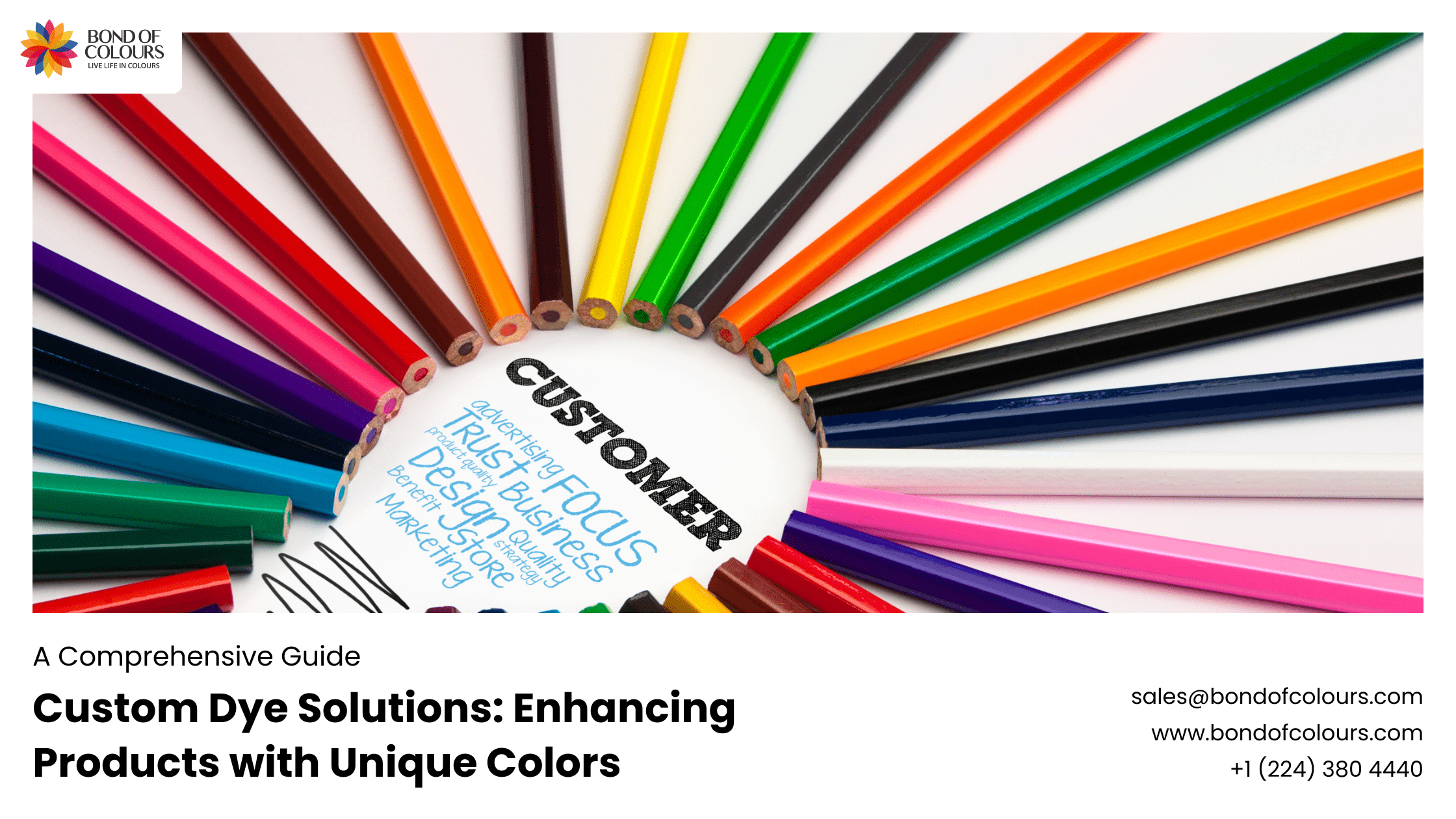Address
304 North Cardinal
St. Dorchester Center, MA 02124
Work Hours
Monday to Friday: 7AM - 7PM
Weekend: 10AM - 5PM
Address
304 North Cardinal
St. Dorchester Center, MA 02124
Work Hours
Monday to Friday: 7AM - 7PM
Weekend: 10AM - 5PM
Discover how custom dye solutions can transform your products with unique colors. Explore types of dyes, applications across industries, and benefits of customizing hues to match your brand identity.

Custom Dye Solutions for Unique Product Needs
In a world where individuality and uniqueness are celebrated, custom dye solutions have become a game-changer. Whether you’re in the fashion, food, or cosmetic industry, the ability to customize the color of your products can set you apart from the competition. Let’s dive into the fascinating world of custom dye solutions and explore how they can meet your unique product needs.
Custom dye solutions are specially formulated dyes designed to meet specific color requirements for various products. Unlike off-the-shelf dyes, these solutions are tailored to achieve precise shades and hues, ensuring that the final product matches your vision.
There are several types of dyes used in custom dye solutions, including natural, synthetic, and organic dyes. Each type has its unique properties, benefits, and limitations.
Choosing custom dye solutions offers numerous benefits, including the ability to create unique and consistent colors, enhance product appeal, and align with brand identity. Many successful brands have leveraged custom dye solutions to create iconic products. For example, think of the distinctive red soles of Louboutin shoes or the signature purple of Cadbury chocolate.
Natural dyes are derived from plant, animal, or mineral sources. They are known for their eco-friendly properties and have been used for centuries. However, they may have limitations in terms of color range and stability.
Synthetic dyes are man-made and offer a broader spectrum of vibrant colors. They are often more stable and consistent than natural dyes but may raise environmental and health concerns.
Organic dyes are similar to natural dyes but are certified to be free from harmful chemicals. They provide a balance between eco-friendliness and performance, making them a popular choice for environmentally conscious brands.
Custom dyes find applications in various industries:
In the textile industry, custom dyes are used to create unique fashion statements. From high-end couture to everyday wear, custom dyes can bring fabrics to life. Home textiles like curtains, upholstery, and bedding also benefit from custom dye solutions, adding a personal touch to home decor.
Natural food coloring is a significant application of custom dyes in the food industry. These dyes ensure that food products not only look appealing but also remain safe for consumption.
In the cosmetic industry, custom dyes are used to create vibrant and safe products. From lipsticks to eyeshadows, custom dyes help brands achieve the exact shades they need while ensuring safety for skin application.
The custom dyeing process involves several steps to ensure the perfect color match:
When selecting a dye for your product, consider factors such as the material of the product, the desired color fastness, and the intended use. Matching the dye to the product material is crucial for achieving the best results. For instance, certain dyes work better on natural fibers like cotton and wool, while others are more suitable for synthetic materials.
Various dyeing techniques can be employed to achieve different effects:
Tie-dye is a popular technique that involves tying the fabric in knots before dyeing, resulting in unique patterns.
Dip dyeing involves dipping parts of the product into the dye, creating a gradient effect.
Screen printing uses a mesh screen to apply dye in specific patterns, ideal for detailed designs.
Digital printing uses advanced technology to apply dye directly onto the product, allowing for precise and intricate designs.
Sustainability is a growing concern, and eco-friendly dye solutions are gaining popularity. These dyes use sustainable practices and materials, reducing environmental impact. Brands that adopt eco-friendly dyes not only contribute to environmental conservation but also appeal to conscious consumers.
The dyeing industry is continually evolving, with new technologies and trends emerging. Innovations such as digital dyeing and sustainable dyeing practices are revolutionizing the industry, offering more options and better results.
Despite the benefits, custom dyeing comes with challenges. Common issues include achieving consistent color across batches, managing costs, and ensuring quality control. Overcoming these challenges requires expertise and careful planning.
The cost of custom dye solutions depends on factors such as the type of dye, the complexity of the dyeing process, and the scale of production. A cost-benefit analysis can help determine if custom dye solutions are a worthwhile investment for your product.
Finding the right custom dye professional is crucial for success. Look for experts with experience in your industry and a track record of delivering high-quality results. Collaboration is key, so communicate your vision clearly and work closely with the professional throughout the process.
Many brands have successfully implemented custom dye solutions to create unique products. These success stories can provide inspiration and insights into the potential of custom dyeing. Learn from their experiences and apply the lessons to your own projects.
Custom dye solutions offer a world of possibilities for creating unique and memorable products. By understanding the types of dyes, the applications, and the process involved, you can make informed decisions that enhance your product’s appeal and align with your brand identity. As the industry evolves, staying updated with the latest innovations and trends will ensure that your products remain relevant and competitive.